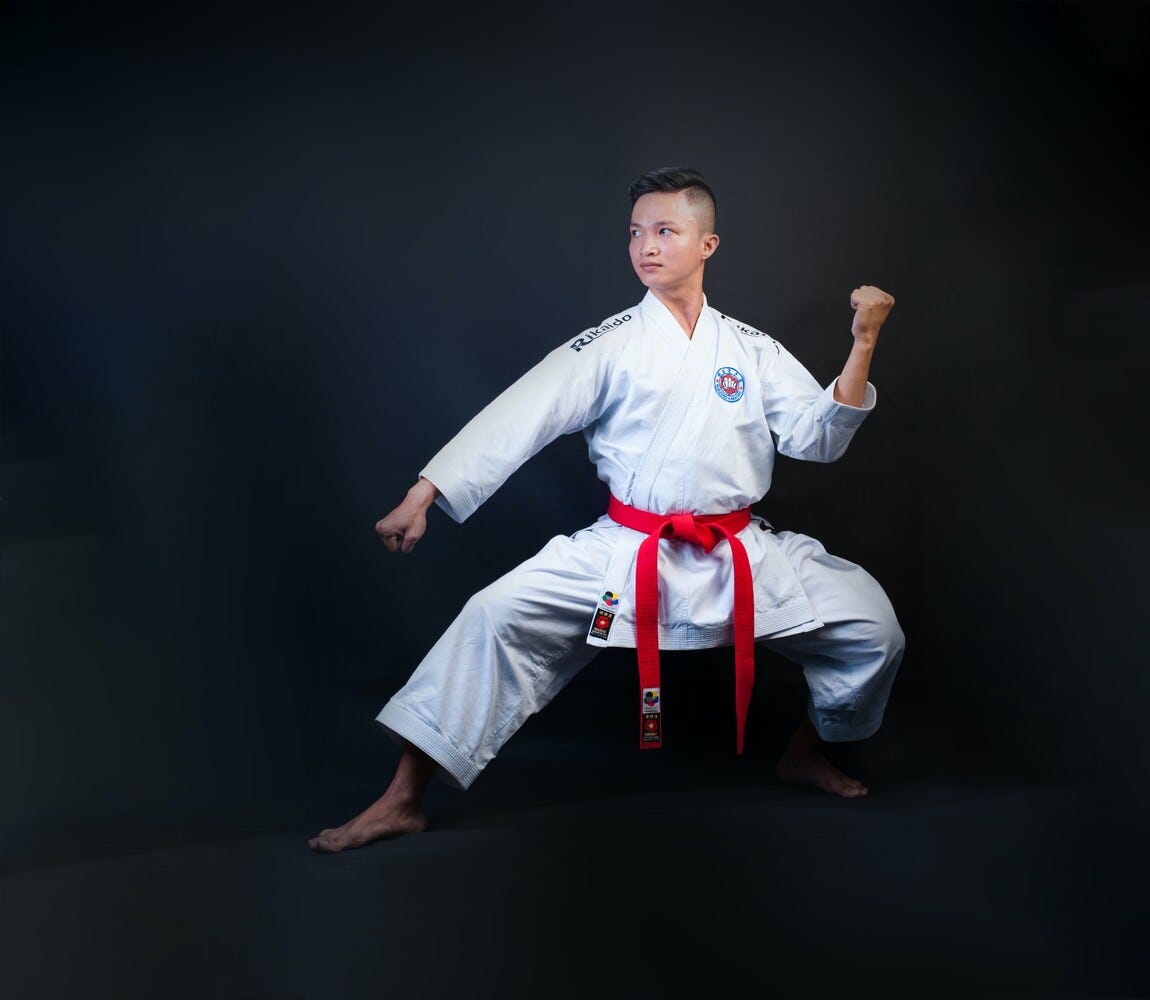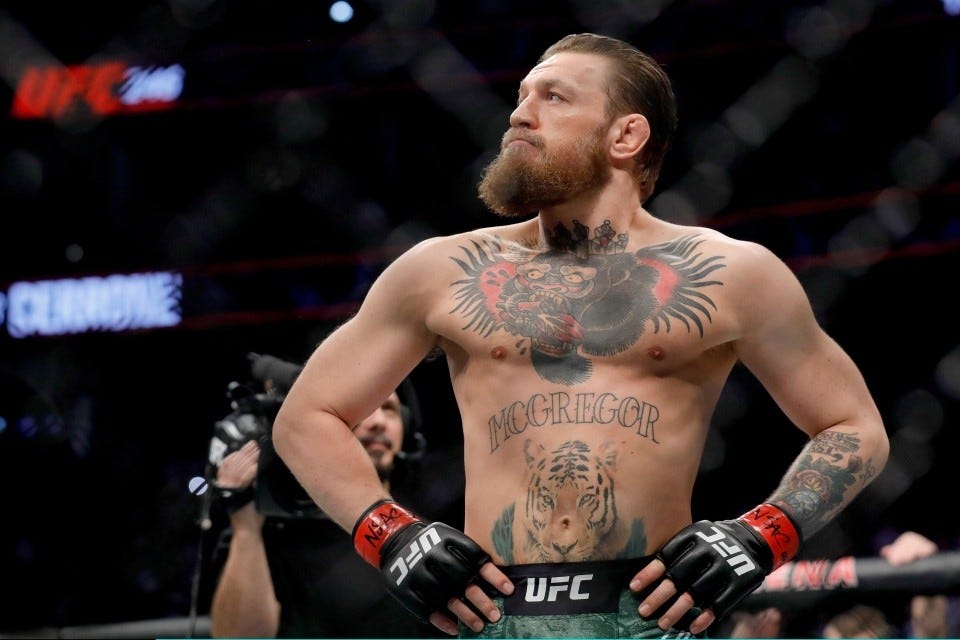Avoiding Fake Experts
Our Models of Expertise
Martial artists have always been intriguing, mystical and fascinating. Most of us have watched martial arts movies made in China or Japan and therefore our conception or model of a martial arts expert resembles this.

To most of us, if someone looked like this, could do some mystical talk, jump and move in wired ways, they are a martial arts expert. Some of us might have even visited Shaolin temples and seen the monks practising martial arts. This model of an expert is based on our exposure to movies, pictures, stories and sometimes travel.
Thanks for reading Prashant's Learning Diaries! Subscribe for free to receive new posts and support my work.
Watch and Learn
And, then there are some of us who have seen mixed martial arts (MMA) practised in the UFC. To us, a martial artist looks more like this.

But we also know they can look like this.

Or this.

After watching MMA for a while, you understand that it does not matter how the artists look or talk, mystery or no mystery, as long as they can fight and win. Their domain of expertise is fighting and that is what should decide how good or bad they are. There are a lot of fighters who look great, talk mystically, dress like a monk and then elbowed in the first 10 seconds of the fight.
Our model of a Martial Arts expert gets updated as we see more and more fighters in action, in their real domain fighting - NOT talking, posing, jumping, or meditation. The more we are exposed to MMA, by watching, by talking to these experts or by actually perusing MMA, the more our model improves.
This new model of expertise is NOT the perfect model of MMA expertise but it is a better model than the naive models that we formed after watching movies or reading stories.
Fake Expertise - When Models Don't Improve
There was a time before the UFC when anyone could be an MMA expert. Mixed martial arts or MMA was not popular and anyone that fit in the naive models of an MMA expert could trick you into believing they were an expert.
Here is a guy with a touch of death.
And here are some more. (Watch them, they are funnier than those cat videos that you watch in your free time.)
They could also trick you into following them as disciples and inherit their naive models of expertise.
Are all of these people intentionally committing fraud?
Some of them, yes, but not all of them. A lot of them have a flawed conception of what a Martial Arts expert is supposed to be. Some of them believe it so much that they get into a ring with an actual martial artist, and then this happens.
Or this.
Most of them end up looking like this at the end of the fight.

People who are willing to go in the ring to get punched in the nose, actually believed that they are experts. They actually believe the lie and then transfer this belief to their disciples who then wholeheartedly believe them and promote them. They gain disciples, open gyms, or youtube channels, and make money.
The same can be said about experts in other fields - not all the people who claim to be experts actually are experts. Go to google or youtube, everyone is an expert.
Why improve your Model of Expertise?
The goal of learning is to gain expertise in a domain - to become an expert at something. To become an expert, we have to first find out what real expertise looks like and follow in their footsteps.
The problem is this - all of us have some naive understanding of expertise in our heads. If we keep using your naive model we might end up wasting your time like the disciples of fake MMA experts. And worse, keep learning, without realising that we are not moving towards expertise until someone breaks our nose - figuratively or literally.
Spotting Fake Experts
The magnitude of the fake martial-artist problem significantly decreased after the advent of the UFC. What UFC has done is given them a platform to perform their actual craft in front of the whole world rather than talk in terms of vague, platonic one-liners. They have to walk the walk after talking the talk and all of us can see it. Once that happened, all of us could see the evidence of expertise.
Evidence
Evidence, evidence, evidence, is the only way to know the truth. This concept is very intuitive to all of us, as long as the evidence is simple and readily available. A singer who can sing well consistently is an expert at singing. A chef whose restaurant is always full is a great chef. We have simple models like these, based on available evidence, and these work most of the time.
But spotting fake experts is not as easy as this when it comes to complex domains where we either don't have the evidence or we don't know how to interpret evidence. How do you know if someone is an expert philosopher? or a physicist? Or a neuroscientist? What evidence will you seek?
Most accurate will be by measuring their success in the field. You can read their papers, and their book, and know about their inventions, their discoveries and their employers.
But then how do you understand if a paper is good or bad? Or if having a patent was actually influential in their field? If could make these judgements, great, but most of us seek simpler answers.
One simple answer is 'their credentials. Check their degrees and certificates. But does having credentials make you an expert? If someone has a degree, they might be good, average, or great. I have a credential in computers, and I for a fact know that I am not an expert.
What else? Will you ask about their marks? But then how do you know if their performance in college translates to their real-world expertise?
What else? Experience? Resume? Recommendations? There is no end.
However, what you need to understand is this - no end is required. Your models will always be inaccurate but that is okay as long as you know the limitations of your models. As we learned from the MMA example, just merely watching the act of real MMA is better than trusting movies. If not, you can see their records or their credentials. You can make your model as accurate as you want, but you need to make it only accurate enough to be useful. Once you are confident enough in your model, you can then use it for predictions. With two conditions - one, understanding that these models are not completely accurate, they may have pitfalls and two, these models can change when new evidence arises.
Irrelevant Evidence
One pitfall in the evidence approach is tackling irrelevant evidence. All evidence is not equal. Think about this - if someone has millions of views on their youtube cooking channel, does it make them a great cook?
Watch this hilarious video for an example:
If you have ever had butter chicken, you know that something is fishy here. Yet there are millions of views on the channel. Views don't prove if someone is a great cook. The alignment of the evidence to the actual statement matters. Yet, we keep making the same mistakes.
Heuristics
In the real world, people rarely do this much work before making up their minds on anything. Most of us seek heuristics or rules of thumb to make decisions. One such rule of thumb is, that if people I trust say they are an expert, they must be an expert. Another is, that if a lot of people say they are an expert, they must be an expert. This is social proof. This again is a great model and helps us spot experts however, like any other model, this model of recognising expertise, also has some issues.
One issue is, again, the irrelevance of evidence. People recommending you items they themselves have no experience with.
Another is fake proof. What if all the reviews and testimonials, about the person you are trusting as an expert are paid reviews? An example would be someone asking for money to feature you in a magazine or an article. Here is an email I received regarding being featured in a Magazine as an Expert:

Becoming an Expert
To become an expert, you have to first find out what real expertise looks like. For that, you can build a model of expertise by seeking evidence or applying heuristics like trusting others. Then do the things that they do, and achieve the outcomes that they achieve. All the while keeping in mind that your model is open to change and that it has limitations.
Thanks for reading Prashant's Learning Diaries! Subscribe for free to receive new posts and support my work.